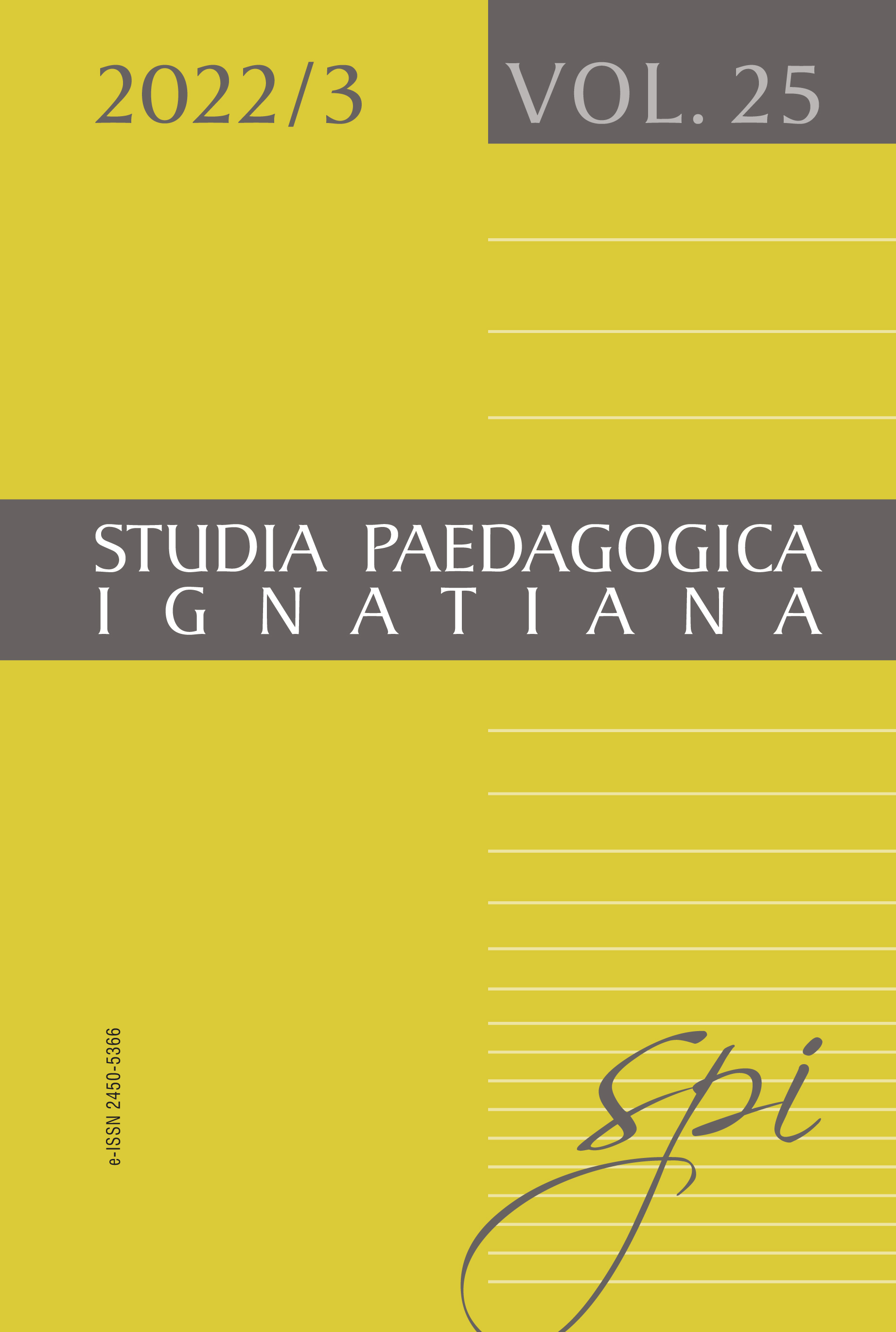Education from the Perspective of the Philosophy of Dialogue: Ethical Aspects During the COVID-19 Pandemic
DOI:
https://doi.org/10.12775/SPI.2022.3.007Keywords
education, dialogue, meeting, ethics, philosophy of dialogueAbstract
The personal relationship between teacher and student is an important element of the educational process. It takes place in a specific space, which is usually a school. Interpersonal relationships and the space in which the interaction occurs are very important for understanding the essence of humankind. Problems related to the understanding of interpersonal relationships and their place in the broader educational process are also key issues in the philosophy of dialogue, as perceived by Józef Tischner. Therefore, the article first presents the main outlines of the philosophy of dialogue, understood as a starting point for education; then it emphasizes the importance of dialogue in education and the role of the meeting between teacher and student in the educational process. Over the last two years of the COVID-19 pandemic, interpersonal relationships have been greatly limited and sometimes even impossible, while the learning process was carried out remotely. With this in mind, the article discusses the ethical dimension of education in both real and virtual meetings. The main aim of the article is to draw attention to the threats facing today’s changing education and to emphasize one of the important elements of education, which is educational dialogue.
References
Gadacz T. (1991). Wychowanie jako spotkanie osób, „Znak”, nr 436(9), s. 50–62.
Hamer H. (1994). Klucz do efektywności nauczania. Poradnik dla nauczycieli, Warszawa: Veda.
Juraś-Krawczyk B., Śliwerski B. (red.) (2000). Pedagogiczne drogowskazy, Kraków: Oficyna Wydawnicza „Impuls”.
Kiereś H. (2001). Dialog, [w:] Encyklopedia „białych plam”, t. 5, Radom: Polskie Wydawnictwo Encyklopedyczne, s. 49–50.
Kiereś H. (2001). Dialogu filozofia, [w:] Powszechna encyklopedia filozofii, t. 2, Lublin: Polskie Towarzystwo Tomasza z Akwinu, s. 570.
Tischner J. (1982). Myślenie według wartości, Kraków: Znak.
Tischner J. (1990). Filozofia dramatu, Paris: Éditions du Dialogue.
Tischner J. (2018). Etyka wartości i nadziei, [w:] J. Tischner, Alfabet duszy i ciała, oprac. i wybór W. Bonowicz, Kraków: Znak, s. 68.
Downloads
Published
Versions
- 2022-09-26 (2)
- 2022-09-26 (1)
How to Cite
Issue
Section
License
Copyright (c) 2022 Szymon Tarka

This work is licensed under a Creative Commons Attribution-NoDerivatives 4.0 International License.
By submitting an article, the author declares that:
they are the author of the article (hereinafter referred to as the Work) and:
- is entitled to exclusive and unlimited copyright to the Work,
- is entitled to dispose of the copyrights to the Work.
The Author grants the Jesuit University Ignatianum in Cracow a free, non-exclusive, territorially unlimited license to use the Work in the following fields of exploitation:
- publishing the Work in paper, digital or magnetic form;
- multiplying the work by any method, without limiting the number of editions or copies;
- distribution of the work and its copies in any form, including marketing, sales, lending, and lease;
- placing the work in a computer memory;
- distribution of the work in information networks, including the Internet;
- public performance, exhibition, display, reproduction, broadcasting and re-broadcasting, as well as making the Work available to the public in such a manner that everyone could have access to it at a time and place chosen by themselves;
- within the scope of dependent rights to the Work, covering, in particular, the right to make necessary changes to the Work, resulting from editorial and methodical preparation, as well as to make translations of the Work into other languages.
The license right shall be transferred the moment of transfer of the Work to the Jesuit University Ignatianum in Cracow. The Jesuit University Ignatianum in Cracow is entitled to grant sub-licenses to the Work in terms of the right granted. The license shall be limited in time for a period of 15 years from the date it is granted.
Stats
Number of views and downloads: 915
Number of citations: 0



